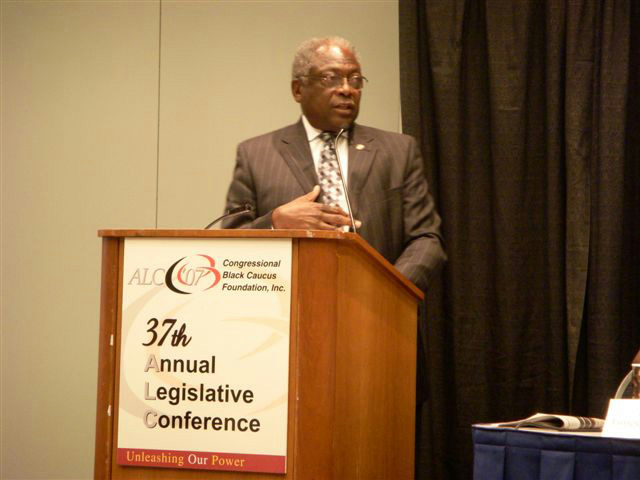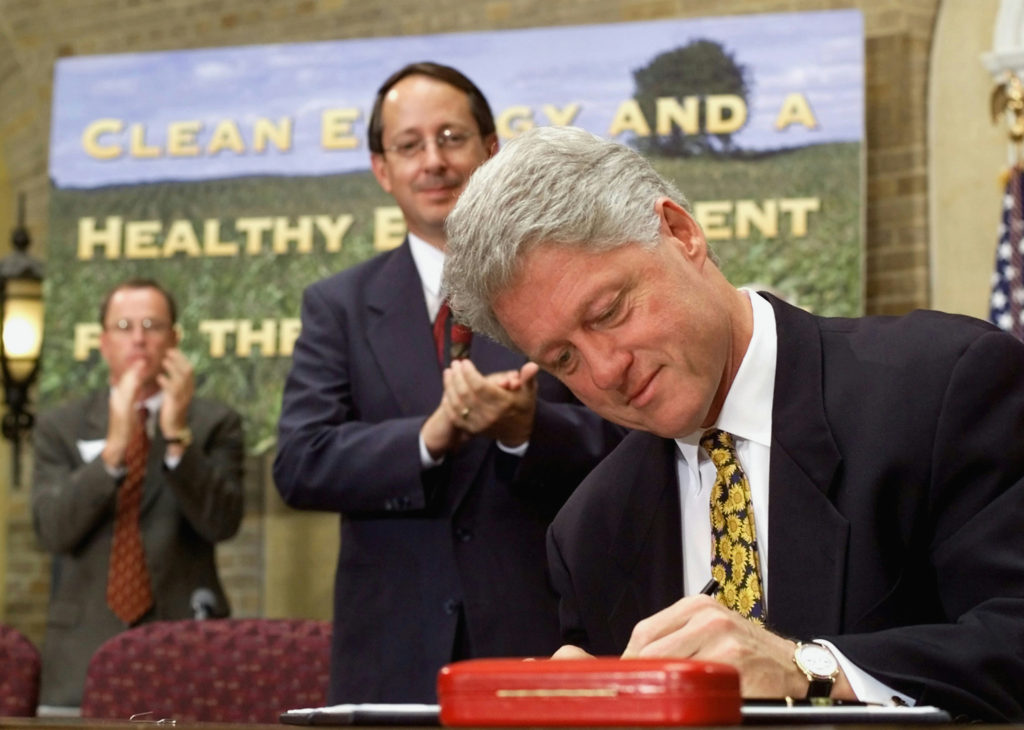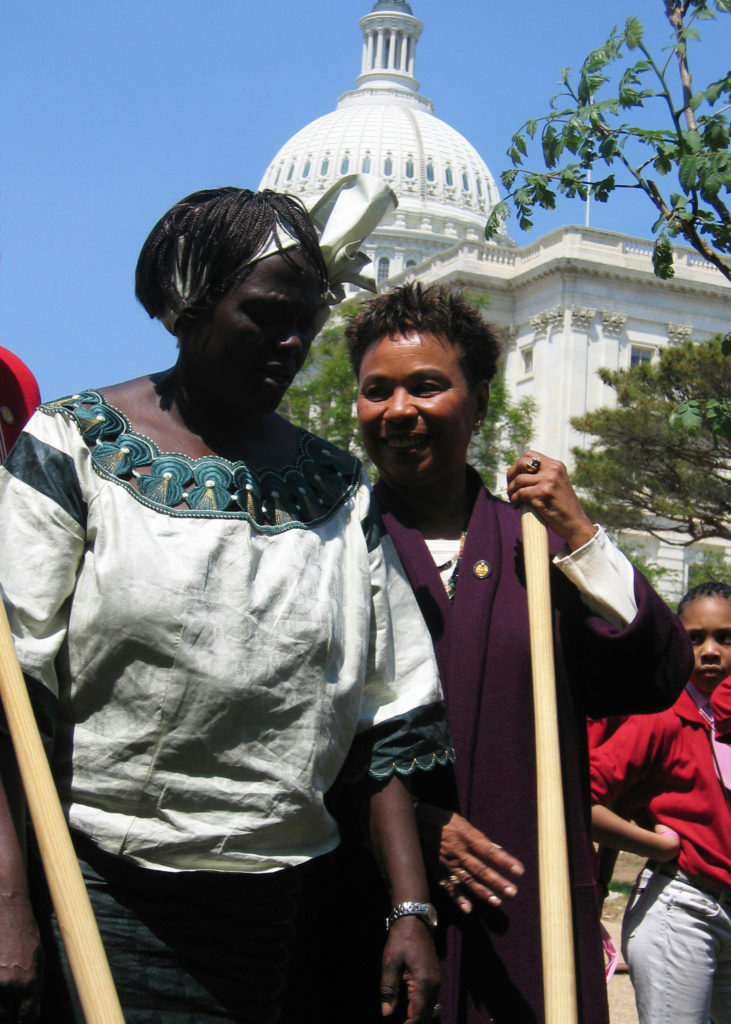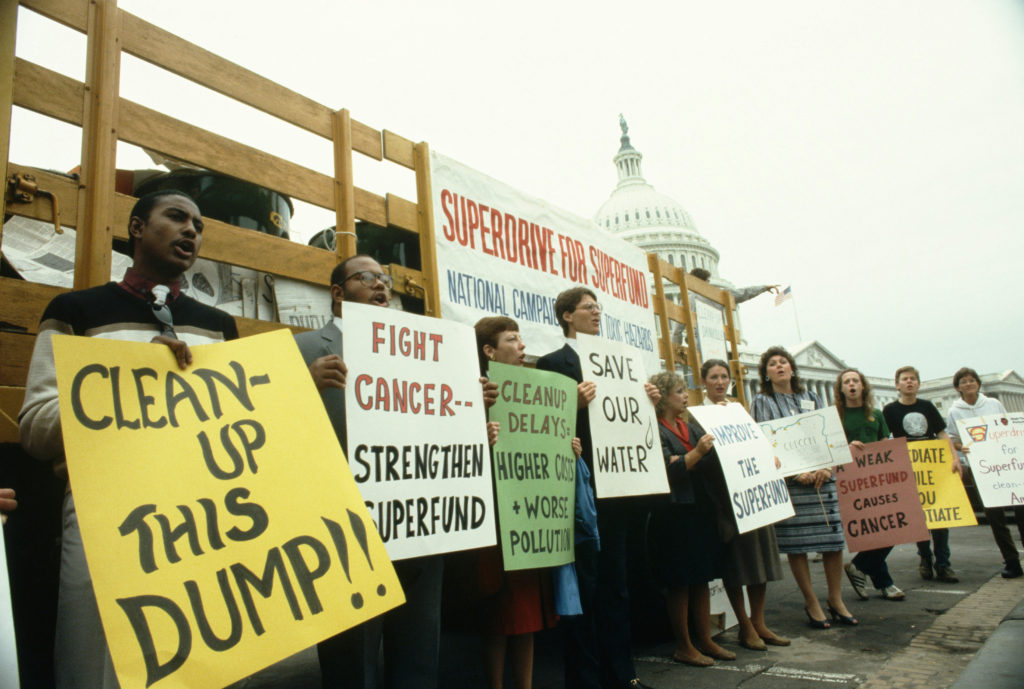Environmental Justice: Public Advocacy
Discover how members of the CBC have led the way in championing the Environmental Justice movement.

Rep. James Clyburn Speaking at 2007 Environmental Braintrust
Congressional Black Caucus members have taken an active role in promoting environmental justice in their home communities and in communities of color throughout the United States. They have displayed their public advocacy in many ways, including building partnerships with environmental organizations and community-based organizations to increase awareness about environmental issues.
In 1999, the Congressional Black Caucus first convened the Environmental Justice Braintrust at the Congressional Black Caucus Foundation’s Annual Legislative Conference. The forum brings together a wide range of technical experts, policy makers, medical officials, and community activists to discuss issues related to environmental justice, including public health and economic development.
The National Environmental Policy Commission (NEPC), an outgrowth of the Braintrust, issues an Environmental Justice Report at the Braintrust each year. This report offers important recommendations to Congress about what can be done to advance environmental justice in the United States. According to Rep. Clyburn, “This Commission was created out of the need to develop a comprehensive national environmental justice policy that fosters the protection of human health and the environment, and ensures environmental justice while promoting economic development.”
CBC Members regularly address environmental justice issues as part of the Congressional Black Caucus Foundation’s Annual Legislative Conference. Topics throughout the past several decades have included natural disaster relief, environmental impacts on health, and environmental policy. In 2005, the Congressional Black Caucus established the Environmental Justice Braintrust on Hurricane Katrina in response to the events which occurred on the Gulf Coast. Reps. James Clyburn, Alcee L. Hastings (D-FL), and Bennie G. Thompson (D-MS) hosted this event meant to identify environmental issues, recommend strategies, and assist policy makers in the development of progressive comprehensive environmental policy. Rep. Hastings hosted a panel discussion during the 109th Congress entitled, Environmental Justice: Identification to Implementation: A Policy Discussion about Current Environmental Challenges and the Legacy of Executive Order 12898. In 2007, Reps. James Clyburn and Albert R. Wynn (D-MD) hosted a Braintrust to raise awareness about health disparities and the environment. In 2023, the Braintrust focused on the intersectionality of environmental justice and health disparities during the COVID-19 pandemic.
Black members of Congress have been strong advocates for both the environment and impacted populations following major environmental and natural disasters. After a November 2007 oil spill in the San Francisco Bay, Rep. Barbara Lee (D-CA) was active in investigating the causes of the spill, monitoring the cleanup, and working towards preventing future disasters. Rep. Lee has also been an advocate for funding environmental justice programs through her service on the Appropriations Committee. CBC members wrote letters, made floor speeches, and actively spoke out in the press for equity in disaster response following major hurricanes including Hurricane Katrina in 2005 and hurricanes in the U.S. Virgin Islands in 2017. In 2023, CBC members Reps. Bennie Thompson (D-MS) and Troy Carter (D-LA) joined with Reps. Dina Titus (D-NV) and Brian Higgins (D-NY) to found and co-chair the Disaster Equity and Building Resilience Caucus. The Caucus’ mission is to lead Congress in ways to make disaster outcomes more equitable and reduce barriers to recovery for low-income communities and communities of color. Other CBC members also joined the new caucus including Reps. Donald Payne (D-NJ), Bonnie Watson Coleman (D-NJ), Sheila Jackson Lee (D-TX), Ritchie Torres (D-NY), Al Green (D-TX), Yvette Clarke (D-HY), Glenn Ivey (D-MD), and Del. Eleanor Holmes Norton (D-DC).
Learn more about the CBC response to Hurricane Katrina in the Public Advocacy Spotlight section.
CBC members have taken a leading role in writing letters to policy makers, meeting with key environmental groups and leaders, and holding information sessions in their communities. For instance, in the early 1990s, Del. Eleanor Holmes Norton (D-DC) brought national attention to the neglected state of urban rivers polluted by trash, raw sewage, and runoff from city streets when she fought tirelessly for the clean-up of the Anacostia River in Washington, D.C. In 1997, then senior chief deputy whip in the Democratic Caucus, Rep. John R. Lewis (D-GA), sent a letter to President William “Bill” Clinton urging his support for improved air quality standards – arguing asthmatic children and the elderly suffer particularly from ozone and particulate pollution. In 1998, CBC members, including Reps. John Conyers Jr. (D-MI), Jesse L. Jackson Jr. (D-IL), William J. Jefferson (D-LA), Robert C. “Bobby” Scott (D-VA), John R. Lewis, and Maxine Waters (D-CA), met with the EPA’s Council on Environmental Quality and the President’s Initiative on Race on behalf of the residents of Covent, Louisiana. The group worked alongside the environmentalist group Greenpeace in their efforts to challenge the Shintech Corporation and to press their claim that the site’s location was discriminatory to low-income minorities, most of whom are Black.
More recently, 44 members of the CBC composed a letter to President Barack Obama in 2016 calling for a federal investigation into the Flint, Michigan water crisis and for funding to assist in the city’s recovery and future preventative efforts. The Caucus then wrote to President Donald J. Trump in 2017 to again call for assistance for Flint and to question the Trump administration’s commitment to water safety considering the administration’s proposed budget cuts to the EPA. In 2017, the CBC published We Have a Lot to Lose: Solutions to Advance Black Families in the 21st Century, a report outlining policy recommendations on a wide array of issues impacting Black Americans for the new Trump Administration. The report included a call for improving the nation’s infrastructure as part of the environmental justice section and recommended the federal government play a greater role in assisting state and local governments with repairing aging infrastructure.
CBC members continue broadening the scope of their activism as new environmental challenges arise. As the “Conscious of the Congress,” the CBC remains committed to guaranteeing the basic rights of clean air, water, and soil to every American. As the late CBC-member Rep. John Lewis (D-GA) wrote in a 2008 piece for Waterkeeper Alliance:
“We all need to breath fresh air, drink clean water and eat safe food. These things are all necessary for us to live, and I believe that access to these vital components of human life is a sacred right that should not be violated.” (Lewis, “Beloved Community,” #24 Environmental Justice)



